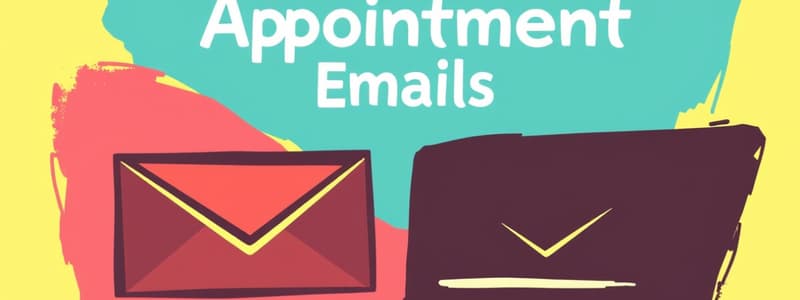Podcast
Questions and Answers
What is a suitable formal way to ask for an appointment?
What is a suitable formal way to ask for an appointment?
- Let’s catch up on Tuesday.
- Can we meet for a coffee?
- What about our meeting?
- I would like to arrange an appointment to discuss…. (correct)
How can you express unavailability for an appointment in a formal manner?
How can you express unavailability for an appointment in a formal manner?
- I will be out of the office on Wednesday and Thursday, but I will be available on Friday afternoon. (correct)
- I'm not free that week.
- I have other plans.
- I can't meet then.
What is an informal way to suggest a time for a meeting?
What is an informal way to suggest a time for a meeting?
- What about…? (correct)
- Please indicate a suitable time.
- Would you be available Tuesday?
- Is it possible to meet on Friday?
Which phrase is appropriate for apologizing informally?
Which phrase is appropriate for apologizing informally?
How should you ask for confirmation of an appointment in a neutral way?
How should you ask for confirmation of an appointment in a neutral way?
What should you include when writing to someone you don't know?
What should you include when writing to someone you don't know?
Which statement is a way to change an appointment in a formal context?
Which statement is a way to change an appointment in a formal context?
What is a neutral way to suggest a meeting time?
What is a neutral way to suggest a meeting time?
What is an appropriate response if you have to cancel an appointment?
What is an appropriate response if you have to cancel an appointment?
Which of the following expressions can be used when suggesting a time?
Which of the following expressions can be used when suggesting a time?
Flashcards are hidden until you start studying
Study Notes
Appointment Email Guidelines
- Making Appointments: Use clear expressions to request a meeting based on formality levels.
- Formal Request: "I would like to arrange an appointment to discuss…" followed by a request for a suitable time and location.
- Neutral Request: "Would it be possible to meet on (date) at your/our offices to discuss…?"
- Informal Request: "Can we meet (up) to talk about…?"
Suggesting a Time
- Neutral Suggestion: "Would Tuesday suit you?" or "Would you be available on Tuesday?"
- Informal Suggestion: Use casual phrases such as "What about…?" or "Let’s say…"
Agreeing to an Appointment
- Formal Agreement: Acknowledge the email and confirm availability with details: "Thank you for your email. I would be available to discuss… on (date) at (time and place)."
- Neutral/Informal Agreement: "Tuesday sounds fine. Shall we say around (time) at (place)?"
Declining a Time
- Formal Decline: Clearly state unavailability, e.g., "Unfortunately, I will be away on business during the week of July 6 – 11."
- Offer Alternatives: Suggest another time to meet, e.g., "I will be available on Friday afternoon."
Cancelling an Appointment
- Formal Cancellation: Use phrases like "Unfortunately, due to some unforeseen business, I will be unable to keep our appointment…"
- Neutral Cancellation: State the cancellation reason and suggest a later date: "I’m afraid that I have to cancel our meeting on Wednesday… Would you be free to meet early next week?"
Apologising for Changes
- Formal Apology: "I apologise for any inconvenience."
- Informal Apology: "I’m sorry about cancelling."
Asking for Confirmation
- Neutral Confirmation Request: "Please confirm if this date and time is suitable/convenient for you."
- Informal Confirmation Request: "Can you let me know if this is OK for you?"
Approaching Unknown Contacts
- Introducing Yourself: Provide background information when contacting someone unknown, such as "I am… and I would be interested to meet you to discuss…"
- Requesting Availability: Politely ask for a suitable time to meet during the week, e.g., "I would be grateful if you could indicate a convenient time to meet."
- Closing Statement: Conclude with a positive note, e.g., "I look forward to hearing from you."
Studying That Suits You
Use AI to generate personalized quizzes and flashcards to suit your learning preferences.




